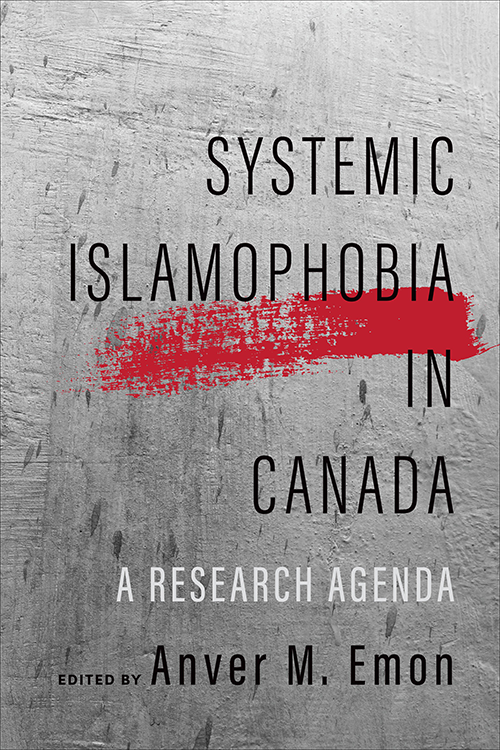Right now, a particularly somber legal trial is taking place in southern Ontario. Two years ago, four members of a Muslim family in London were struck and killed by a pickup truck while out for an evening walk; its driver now stands accused of their murder.
Not long after this tragedy occurred, Statistics Canada reported that during the period from 2020 to 2021, hate crimes against Muslims in Canada had jumped a staggering 71 per cent.
The London killings — much like the fatal shooting of six worshipers in a Quebec mosque in 2017 — received international attention, shocking a nation long accustomed to priding itself on multicultural tolerance. Soon after, the federal government convened a national summit on Islamophobia.
But for Anver Emon and other Muslim observers, the summit did not go far enough in its pledge to right systemic, rather than individual wrongs. In view of this limitation, Emon decided to invite a variety of observers to contribute essays for a new book entitled Islamophobia in Canada: A Research Agenda.
Emon — a professor at the University of Toronto’s Faculty of Law and Faculty of Arts & Science — is the director of the Institute of Islamic Studies in the Faculty of Arts & Science and holds the Canada Research Chair in Islamic Law and History.
“During the summit,” he says, “there was a focus on Islamophobia in the street, which often presumes the government as umpire or referee. I believe it’s time for a serious conversation around how Islamophobia is institutionally enabled under the guise of policy.”

To create a more robust conversation, Emon came up with the idea of a book that would “identify what it would look like to tackle systemic Islamophobia: not only in government, but in other institutions as well. Because no system is immune.”
The book is a collection of 17 essays written by experts in a wide variety of fields. The essays, which are, in Emon’s words, “short, direct, and methodologically inquisitive,” reveal an ecosystem in which so-called “lone wolves” such as the London and Quebec killers learn their deadly lessons.
Emon’s interest in this topic was honed by his earlier research, Under Layered Suspicion, in which he and co-author Nadia Z. Hasan (York University) examined the extent to which the Canada Revenue Agency (CRA) was unfairly targeting Muslim charities.
Though Prime Minister Justin Trudeau pledged in the wake of this report and considerable advocacy that his government would investigate the issue, Emon says the process has since been hampered by secrecy on the part of the CRA — secrecy that he believes is all too common when victims of systemic discrimination attempt to prove its institutional presence.
“It’s really hard to find evidence at that level,” Emon says. “Sometimes privacy or national security rules restrict evidence acquisition; in some cases, the government doesn’t collect relevant data. The evidence might be there, but it’s hidden from view.”
This, he says, means that academics and others need to be especially creative and determined when researching how Islamophobia is manifested at the level of government, education, justice, media and other institutions as well.
Systemic Islamophobia in Canada recounts not only the tragedies in London and Quebec, but the angry debates over Motion 103 in 2017, which called on the federal government to condemn Islamophobia in the country. Although the motion was eventually passed, its introduction led to protests and death threats against Iqra Khalid, the MP who presented it — even though similar motions had already been passed condemning discrimination against other faith groups.
Another essay details the story of a professor dismissed by his university employer for antisemitism after a supplication in his mosque was wrongly translated; others deal, variously, with the particular difficulties experienced by Black and gender diverse Muslims, as well as the historical misunderstanding and fear of Sharia not only Canada, but in the Commonwealth as a whole. There is also an exploration of how Quebec’s use of the Charter of Rights and Freedom’s notwithstanding clause in Bill 21 infringes on human rights by banning the wearing of religious symbols, such as the hijab, in the workplace.
Emon says that this short volume “was never meant to be determinative, or dispositive. It was always meant to gesture to the future: these are the kinds of questions we hope future researchers will undertake.” With that caveat, the book stands on its own as a skillful examination of how systemic racism has taken shape within our society — an insidious process that affects not only Muslims, but other marginalized groups as well.
“I think Canadians and Canadian institutions are very concerned about maintaining their integrity without looking like they’re discriminating or acting in a biased way,” Emon says. “But I think that if we really want to take systemic racism and systemic Islamophobia seriously, we need to accept the fact that we are all embedded in institutions that are already systemically biased.
“As in all cases of systemic bias, it’s not anyone’s fault: there’s no causal button that somebody pushed. But rather than being defensive when someone points it out, as Canadians too often tend to be in my experience, we need to think about solutions. Defensiveness only perpetuates the status quo.”
In the wake of the volume's release, Emon is pleased to be launching a new lab devoted to the study of systemic Islamophobia. Supported by a SSHRC Partnership Development Grant, the Systemic Islamophobia Research Lab (SIRL) is now advertising an application for a postdoctoral fellow to spend two years in residence to examine and publish research on systemic Islamophobia in Children's Aid Societies. For the application portal, please visit the Call for Applications: Post-Doc Fellow, Systemic Islamophobia.

